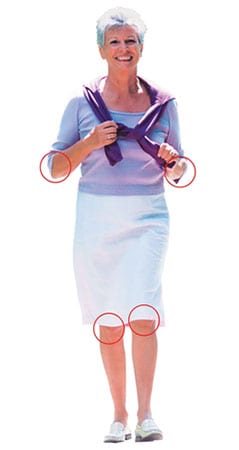METHYLSULFONYLMETHANE (MSM) IS WIDELY USED TOGETHER WITH GLUCOSAMINE AND CHONDROITIN FOR EFFECTIVE RELIEF OF JOINT PAIN.

EXCLAIMING “Ouch!” when climbing up or going down the stairs? Most of us have either first-hand experience with knee joint pain, or know of someone who has.
Arthritis is among the most common causes of knee pain; and osteoarthritis (OA) is the most common form of arthritis.
Osteoarthritis is a chronic condition characterised by breakdown of the joint cartilage. Cartilage is the part of the joint that cushions the ends of the bones and allows easy movement of joints.
Most joint pains are caused by ageing. The cartilage in the joint is important because it allows the joints to move smoothly and helps prevent friction between bones. Most people approaching middle age will find themselves in a situation where their joint cartilage regrowth is unable to keep up with the rate of wear and tear. When the joint cartilage wears out, it causes pain, inflammation and swelling.
What then can we do to elevate these painful symptoms? Here are some tips on what you can do to reduce the pain and stiffness in your joints, and to make day-to-day life easier. Self-help measures can help reduce the stress on your joints and reduce the severity of your condition.
Some of the main ones are listed below.
- Exercise regularly and keep moving. Exercise can help keep your joints working, but it’s important to rest your joints as well. Doing a little exercise regularly may be helpful.
- Try to maintain a healthy weight for your height. This may mean losing weight if you’re overweight, because it puts more stress on your joints, and can make osteoarthritis worse.
- Use a heat pad or an ice pack to help ease pain. Don’t put either of these directly onto your skin as they may cause burns – wrap them in a towel or dishcloth first.
- Supplement with joint health nutrients to help regrow and strengthen your worn-out cartilage.
We’ve heard about the joint health nutrients glucosamine and chondroitin, but what about their lesser-known companion, MSM (methylsulfonylmethane)?
MSM is widely used together with glucosamine and chondroitin for effective relief of joint pain. Many developed nations across the globe such as the US, UK, Europe, Australia and so on, regularly observe positive results in the treatment of osteoarthritis when oral MSM supplements are added to glucosamine and chondroitin nutritional therapy.
MSM is a naturally-occurring nutrient found in normal human diets. MSM is made up of 34% sulphur, the fourth most abundant mineral in the human body. Sulphur is necessary for the structure of every cell in the body. It is needed for the structural integrity of joint cartilage and connective tissue, such as skin, hair and nails.
MSM delivers sulphur to the body in a useable way. It helps maintain the structure of connective tissue by forming cross-linkages through disulphide bonds, ie sulphur strengthens the tissues that make up the joint.
Supplemental MSM helps to support healthy joints and connective tissues such as tendon, cartilage, ligaments and muscle. Studies have also found that MSM helps to reduce stiffness and swelling in joints, thus reducing pain and improving flexibility.
The Arthritis Foundation of America recommends starting with a low dosage of 500mg twice a day, and increasing gradually to 1,000mg twice a day. After starting MSM, allow a reasonable amount of time to notice any benefits.
Other benefits of sulphur include improving the suppleness of skin and shininess of hair and nails, which also become less prone to cracking and splitting.
MSM is an organic form of sulphur, whereas sulphites in foodstuffs are inorganic. Also, many people have been told they are allergic to sulphur by their doctors. The fact is, what the doctor generally means is that they are allergic to antibacterial sulphonamides (sometimes called sulfa drugs). These are synthetic antimicrobial agents that contain the sulphonamide group.
MSM has been found to be safe for most, even those with sulfa allergy. Do consult a healthcare professional if you are unsure.
We know that glucosamine and chondroitin are two clinically-proven nutritional compounds used for the relief of osteoarthritis and knee pain with positive results. For synergistic joint health benefits, glucosamine and chondroitin should be taken with MSM, as glucosamine and chondroitin act as nutrient-building blocks for cartilage, while MSM supplies the sulphur that is needed to strengthen the cartilage.
